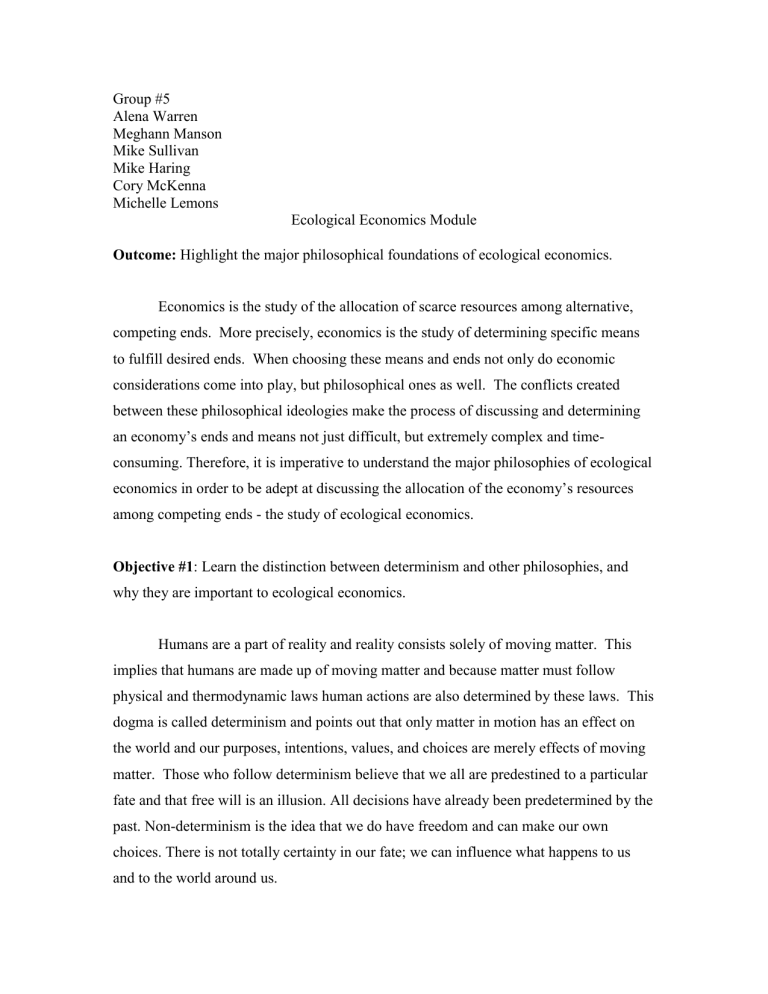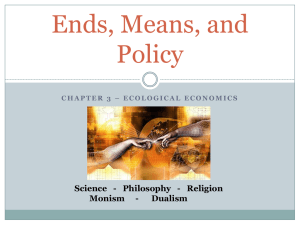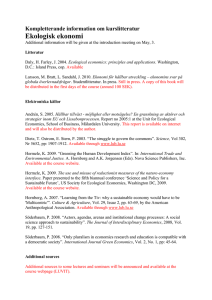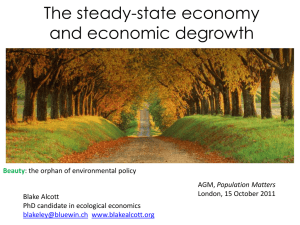Grp5-PhilosophicalFoundations

Group #5
Alena Warren
Meghann Manson
Mike Sullivan
Mike Haring
Cory McKenna
Michelle Lemons
Ecological Economics Module
Outcome: Highlight the major philosophical foundations of ecological economics.
Economics is the study of the allocation of scarce resources among alternative, competing ends. More precisely, economics is the study of determining specific means to fulfill desired ends. When choosing these means and ends not only do economic considerations come into play, but philosophical ones as well. The conflicts created between these philosophical ideologies make the process of discussing and determining an economy’s ends and means not just difficult, but extremely complex and timeconsuming. Therefore, it is imperative to understand the major philosophies of ecological economics in order to be adept at discussing the allocation of the economy’s resources among competing ends - the study of ecological economics.
Objective #1 : Learn the distinction between determinism and other philosophies, and why they are important to ecological economics.
Humans are a part of reality and reality consists solely of moving matter. This implies that humans are made up of moving matter and because matter must follow physical and thermodynamic laws human actions are also determined by these laws. This dogma is called determinism and points out that only matter in motion has an effect on the world and our purposes, intentions, values, and choices are merely effects of moving matter. Those who follow determinism believe that we all are predestined to a particular fate and that free will is an illusion. All decisions have already been predetermined by the past. Non-determinism is the idea that we do have freedom and can make our own choices. There is not totally certainty in our fate; we can influence what happens to us and to the world around us.
Nihilism is the idea that no decision is morally superior to others; essentially it doesn’t matter what we decide to do. Non-nihilism, then, is the belief that some decisions are morally better than others.
These ideas are important to the application of economics. In order to come up with policies, one must be non-determinist and non-nihilist. Otherwise, what would be the point in regulating our behavior if we have no choice, and it doesn’t matter anyway?
Materialism is related to nihilism. Everything is what it is, and if we cannot change our physical world, there is no need to worry about it. Mechanism is related to determinism, being the idea that we are ruled by physical laws, not purpose or free will.
Objective #1 Activities
1. Read Dinosaur Determinism cartoon, and create an original cartoon depicting the relativist point of view. Follow this link to see cartoon: http://www.owlnet.rice.edu/~psyc351/Images/DinosaurDeterminism.png
2. Research the concept of peak oil (suggested site: http://www.lifeaftertheoilcrash.net/ ).
Write a paragraph each for relativism and determinism about how these differing points of view would lead to different management plans, policies, or general attitudes regarding oil consumption. Alternatively, this activity could be used in a classroom setting. The class could be divided into two groups, determinist and relativist, and have a debate about our oil consumption habits.
3. Read the following passage from Ecological Economics by Herman E. Daly and
Joshua Farley:
Materialism, determinism, and mechanism are closely related metaphysical doctrines about the basic nature of reality. If you study the history of philosophy, you will see that they go back to Epicurus, Democritus, and Lucretius, over 2000 years ago, and these doctrines are still very much with us today. It would be arrogant for two economists to think that they can resolve this ancient puzzle, but also naïve to think that we can sidestep it, since economics is unavoidably about choice. If choice is an illusion, what does that say about economics?
Because humans are part of reality, it follows that, if matter in motion is all there is to reality, then that is all there is to humans as well. Since the motions of matter are determined by mechanical law, it follows that the same laws ultimately determine human action. This determinism rules out free will- it means that our
purposes are not independently causative in the world. Only mechanical motion of matter is causative. Purposes, intentions, values, choices are all more or less dreams or subjective hallucinations. They are effects, not causes.
Nihilism, the rejection of all moral values, is the ethical consequence of the materialist, determinist cosmology. Things are what they are, and you can do nothing about it because your will and purpose have no power to change things.
You can have no responsibility for what cannot be otherwise. For Epicurus his was a great relief- much better than worrying about the gods’ anger and retribution, about responsibly and guilt and punishment. Relax, don’t worry do your best to enjoy life. Nothing can really hurt you, because when you are dead, that’s the end and you can no longer suffer. This view is still very much alive in the modern secular world, although it has a long history of conflict with
Christianity, Judaism, and Islam, as well as other philosophies that reject materialism and an adequate view of reality. They insist that good and evil are as real in our experience as matter, and that humans have at least some capacity for choice between them. To ignore our direct experience of good, evil, and freedom is considered antiempirical and against the deeper spirit of science.
It is not our intent to convert you either to or from Epicurianism, Christianity, or any other position. Maybe you do not yet have any position on this question.
But logic does have its demands, and no doctrine is exempt from them. Even the early materialists recognized the contradictions involved in a doctrine and ruled out freedom, novelty, and choice. Epicurus tried to restore a modicum of freedom in an ad hoc manner by introducing the nation of the “clinamen”- the idea that atoms swerved from their determined motions for unexplained reasons, and that this was the source of novelty, and perhaps some degree of freedom. Our advice is to be skeptical of any easy answer to a problem that has been around for 2500 years, and also to be humble in the face of any logical contradictions that you cannot resolve.
Now, take this quiz: a.)Explain how materialism, determinism, and mechanism are closely related. b.) In your own words explain the line “If matter in motion is all there is to reality, then that is all there is to humans as well.” c.) Who used the notion of “clinamen” as a way to restore the idea of freedom? d.) True or False: Determinism rules out free will.
Objective #2 : Learn about ends and means with regard to philosophy and economics.
`Economics, at its core, is basically the study of the allocation of scarce resources among alternative, competing ends. We can choose, for example, to allocate wood to the production of houses or as fuel to heat buildings. Then these products are appropriated to consumers, whether it be first time home buyers or large heating plants or whomever desires the particular good or service. In other words, economics is about what people desire and what they are willing to trade to get it.
In economics there are three critical questions that guide the study: What ends do we desire?; What scarce resources do we need to attain those ends?; What ends receive priority, and how much resources should be allocated to them? With respect to the first question, the traditional or neoclassical response is typically utility (usefulness to humans) or human welfare (what goods and services people want). Here the neoclassical economist assumes that people's wants are revealed by market transactions- what goods and services are bought and sold.
Neoclassical economics also operates on the assumption that humans desire for goods and services is unsatisfiable- humans can never have enough of all goods, even if they can get enough of any one good at a particular time- and their welfare is increased with the ever increasing provision of goods and services. With this in mind, perpetual economic growth is generally considered a suitable, measurable representative for the desirable end. The neoclassical choice of mechanism for allocating the scarce resources among alternative ends is the market. The reason neoclassical economics chooses the market for allocation is because under certain conditions (which are rarely completely met) the market can be efficient. Neoclassical economists also call this situation Pareto efficient allocation- when no other allocation of resources can be made such that one person is made marginally better off without making someone else marginally worse off.
This concept of efficiency is so central to the study of neoclassical economics that is often considered to be an end in itself.
While ecological economics recognizes the importance of efficient allocation, it differs from neoclassical economics in its recognition that human welfare depends on factors greater provision of goods and services. Ecological economics makes the important realization that human welfare also depends on factors such as ecosystem services and is affected by pollution. A large body of evidence supports the idea that
ecosystem services are already overstressed and are near a tipping point which may significantly affect present and future human welfare. Because of this ecological economics makes a controversial (although well founded) call for an end for growth. In this context growth is defined as an increase of throughput- the flow of natural resources from the environment, through the economy as goods and services, and back into the environment as waste. However, this does not imply an end to development- qualitative change, realization of potential, improved structure or system, or increase in the quality of goods and services produced. In fact a call for an end to growth leads to sustainable development- a qualitative improvement in the ability to satisfy wants without a quantitative increase in throughput above the environment's carrying capacity. In ending growth and moving towards sustainable development, ecological economics is suggesting a shift from traditional economic ends- such as utility or efficiency- towards higher or ultimate ends.
Assuming that most humans are pluralists, accepting the possibility of more than one ultimate end, ecological economists ask; What are humans highest prioritized goals?
Here the answer can vary dramatically, with no objective right or wrong. However ecological economics believes that there are ends higher than those proposed by neoclassical economics. Happiness, quality of life, reaching heaven (or highest station of any particular religion), and even sustainability are all common answers to what some may consider their ultimate ends. In reaching these ultimate ends, ecological economists have identified ultimate means which can be used most efficiently and sustainably to achieve those ends. Ultimate means are the common denominator of all usefulness, consisting of low-entropy energy-matter. Examples of such ultimate means are solar energy, minerals, and fossil fuels. Use of these ultimate means is the most efficient, sustainable, and environmentally acceptable way to achieve allocation in the market and reaching humans ultimate ends.
Activities for Objective #2
1. The following is an Ends and Means chart. Take the words out of the list below and place them where you believe they belong on the chart. After you have done this analyze the one you have labeled and the chart with the answers on it. Where did you go wrong?
Take the time to study the chart and see why these are places where they are. Can you think of examples for each of them?
Ethics
Economics Politics
Intermediate Ends
Ultimate Means
Answers:
2. Take this quiz on ends and means.
1. . What is the main difference between neo classicalist’s definition of ends and an ecological economist’s definition?
2. Briefly describe why it is more difficult to describe an ultimate end as opposed to an ultimate mean.
3. What mechanism do neo-classicalist economists believe reveal the most desired ends? a. The market. b. The stock market. c. The aggregate demand-supply curve.
4. Ultimate means consist primarily of a. raw materials. b. low-entropy matter-energy. c. synthetic materials.
5. Regarding ends and means, what do ecological and neo-classical economists agree upon?
Quiz answers:
1. Neo classicalists do not take into account ecological well being, only human welfare and economic growth.
2. Ethics makes defining an ultimate end difficult because everyone has a different perception of this end. Ultimate means are easier to define because they are merely what must be used up in order to get to the ultimate end.
3. A
4. B
5. Using means efficiently in the service of ends
3. To be done individually, or with a group including discussion: Write down a list of what you consider to be your desired ends. Then, decide which one is your ultimate end.
Why did you choose the intermediate ends and ultimate ends that you did? (If in a group, discuss as a group what ultimate end you all have in common).
Objective #3: Determine what a Steady State Philosophy is, and why it is desirable.
The ultimate end to an ecological economist is a sustainable, steady-state, economy. This type of economy was mainly developed by John Stuart Mill. The main idea of a steady-state economy is to maintain constant stocks of wealth and people at levels that are sufficient for a long and good life. The throughput by which these stocks are maintained should be low rather than high, and always within the regenerative and absorptive capacities of the ecosystem. The system is therefore sustainable – it can continue for a long time. The path of progress in the steady state is no longer to get bigger, but to get better.
Activities for Objective #3
1.
Read the Steady-State Subsytem and Box 3-2 on page 54 in Ecological Economics:
Principles and Applications .
http://books.google.com/books?id=WGKt763MIbsC&dq=%22ecological+economics+pri nciples+and+applications%22&pg=PP1&ots=a08ScZSjyD&sig=CC3cAe6G-
ZIE2BjxxbT8znmh6aQ&hl=en&prev=http://www.google.com/search?hl=en&q=%22Eco logical+Economics:+Principles+and+Applications%22&btnG=Google+Search&sa=X&o i=print&ct=title&cad=one-book-with-thumbnail#PPA54,M1
Takes notes on these main ideas: steady-state subsystem and input, output, and throughput.
Free write on what population growth would look like in a steady-state subsystem.
2. View the slideshows from the Center for the Advancement of the Steady State
Economy at www.steadystate.org/CASSESlideshows.html for background general information.
Click above to view
3. Watch video on you tube “Climate Change and Uneconomic Growth” and free write about it. Located at http://www.youtube.com/watch?v=OG_1mgKOb6k.
4. Read “In my opinion: the steady state economy-what it is, entails, and connotes,” at http://www.steadystate.org/files/SSE.pdf
. Answer the following questions:
1. How do the principles of a steady state economy relate to wildlife populations?
2. What will population look like?
3. What form of government is most conducive to a steady state economy? Why?
4. Is a steady state economy practical for countries of the developing world?
5. How will the stock market differ in a steady state economy from the current model?
5. Read the original theory of the steady state economy by John Stuart Mill at: http://www.econlib.org/library/Mill/mlP61.html#Bk.IV,Ch.VI
, answer the following questions: a. Does a stationary state imply that development is not possible? If not, what would it look like? b. We are continuing with economic growth as main policy today, yet it was pointed out as early as the 1850s this would not be possible forever. Why do you think nothing has changed since then? c. How does John Stuart Mill see the structure of society in a stationary state, how is it different from what we have today?
Synthesis: The philosophical foundations of ecological economics are just as important as the physical foundations. To culminate this learning activity, write a few paragraphs to answer these questions: a.
Referring to the philosophical principles mentioned here, in what ways does traditional economics fall short of being ethically sound? b.
How does the idea of a steady-state as an ultimate end support the laws of thermodynamics? c.
What are your own philosophical or moral beliefs, and how do they affect your consumption behavior?
References:
Ecological Economics: Principles and Applications by Herman E. Daly and Joshua
Farley
Principles of Political Economy by John Stuart Mills, accessed online at: http://www.econlib.org/library/Mill/mlP61.html#Bk.IV,Ch.VI
In My Opinion: The steady state economy-what it is, entails, and connotes. by Brian
Czech and Herman E. Daly, accessed online at: http://www.steadystate.org/files/SSE.pdf
Corruption of Economics vs. The Steady State Revolution accessed online at: http://www.steadystate.org/CASSESlideshows.html
Climate Change and Economic Growth accessed online at: http://www.youtube.com/watch?v=OG_1mgKOb6k
Determinism cartoon: http://www.owlnet.rice.edu/~psyc351/Images/DinosaurDeterminism.png
Peak Oil website: http://www.lifeaftertheoilcrash.net/
Ecological Economics: Principles and Applications by Herman E. Daly and Joshua
Farley. Island Press
Principles of Political Economy by John Stuart Mill, accessed online at: http://www.econlib.org/library/Mill/mlP61.html#Bk.IV,Ch.VI
“In my opinion: the steady state economy-what it is, entails, and connotes,” by Brian
Czech and Herman E. Daly. Accessed online at: http://www.steadystate.org/files/SSE.pdf
Powerpoint presentations from the Center for the Advancement of Ecological Economics, accessed online at: http://www.steadystate.org/CASSESlideshows.html
“Climate Change and Economic Growth” from: http://www.youtube.com/watch?v=OG_1mgKOb6k









